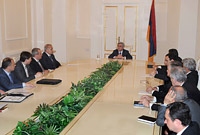Yesterday the RA President Serzh Sargsyan summoned a coalition session, during which, according to our information, it was decided to suspend or recall the Armenia-Turkey protocols from the RA National Assembly till the moment that Turkey brings up the deadline of ratifying those in its parliament.
As of yesterday no information was provided on this. Only the official website of the president posted a statement, which read, “The President of the Republic of Armenia, Chairman of the National Security Council Serzh Sargsyan convened today a meeting of the National Security Council. The President of Armenia informed the members of the Council on his visits to Washington and Moscow. Later, the participants of the meeting discussed the latest developments in the Armenia-Turkey process of normalization. President Sargsyan said that on this issue he had conducted discussions with the leaders of the political coalition member parties. In his April 22 address, the President of Armenia will inform the nation on the decision reached in the course of discussions.” According to our information the president’s message will be followed by a joint announcement of the three ruling parties – RPA, Prosperous Armenia and Legal State, according to which the coalition agrees on withdrawing the signature from the Turkey-Armenia protocols. It means that the RA government has virtually decided to recall their signatures from the Turkish-Armenian protocols. Most probably, this decision was made during Sargsyan’s visit to Moscow. It means that the Russian government “approved” this. It means that in the near future new developments are expected in Armenia in both the foreign and internal political arenas. Moreover, in the near future we should wait for the echo of the US and not so much of Turkey. Thus, during this meeting Turkey has set a clear condition, by which the normalization of Turley-Armenia relations, opening of the border will take place only after an evident benefit of Azerbaijan in the NKR conflict resolution process. And in this case Turkey had a clear demand – remove the Armenian troops from the neighboring territories of the NKR. Moreover, Turkey together with Azerbaijan was demanding to return these territories without clarifying the NKR status. And this demand was brought up by Turkey as a precondition of opening the border. Let us recall that after the DC meetings the US President Barack Obama stated that the OSCE Minsk Group activity should become more active. There was also outflow of information, according to which there was an agreement to the road map, which demands return of the liberated territories to Azerbaijan. By the way, yesterday a little earlier the head of he International Crisis Group Sabina Fraser has made a statement about the Armenia-Turkey relations and the protocols. She said that Armenia and Turkey should focus on the least disputable provisions of the agreement. “There is a little possibility that the protocols will move from the place at least till the next elections in Turkey in 2011 or until Armenia and Azerbaijan sign the long-excepted treaty on the regulation of the NKR conflict,” said Fraser, who as a rule unofficially delivers the standpoint of the US administration. Thus, Fraser reveals the results of the DC meetings, according to which no agreement was reached on opening the border. “This year on April 24 the attention of the Armenians and Turks will focus on whether the US President Obama will utter the word “genocide” in his annual address on April 24.” However, this focus is meaningless because only Armenians and Turks should come to an agreement. According to the protocols Turkey and Armenia were supposed to establish a commission of historians. “For Turks this would be a very good opportunity to preclude the international recognition of the genocide because a few countries would recognize that having known that the commission is still examining those events,” said Fraser. Statements of this sort can also be heard in Azerbaijan where, too, they mostly link Armenia’s strength to its ties with the Diaspora. In particular, those in Azerbaijan often say that but for the Diaspora support, Karabakh would not have won the war and successfully realized the post-war rehabilitation. “Normalization with Turkey will give another benefit to Yerevan,” says Fraser. “At last, authorities in Armenia will be able to show to the Diaspora that they are in a position to carry out policies not depending on its Diaspora’s will.” As a matter of fact after visiting Moscow fro Washington DC Sargsyan has decided to deflect from the Turkey-Armenia process for now. And it’s not excluded that this decision was made in Moscow. Of course, as a result of information outflow it will become clearer what affected this decision of Serzh Sargsyan but it was obviously made abroad. In her statement Fraser also added, “The ratification of the protocols on part of Armenia would lastly pass the ball to the Turkish field and Yerevan would deserve the compliment of the international community but the local opposition is strong,” said Fraser. It would be naïve to believe that Sargsyan refuses the protocols because of the pressures of the Armenian opposition. Here, most probably we have the pressure of Moscow. Indeed, it clear that Fraser couldn’t possibly openly speak about this. And it becomes quite clear that instead of “passing the ball to the Turkish field and deserving the compliment of the international community” Sargsyan has chosen the option of deflecting from the process. Let us also remember that in order to make this version possible the Armenian Parliament in February revised its legislation on international treaties. This enabled the president to withdraw any treaty and agreement in the event of need.

